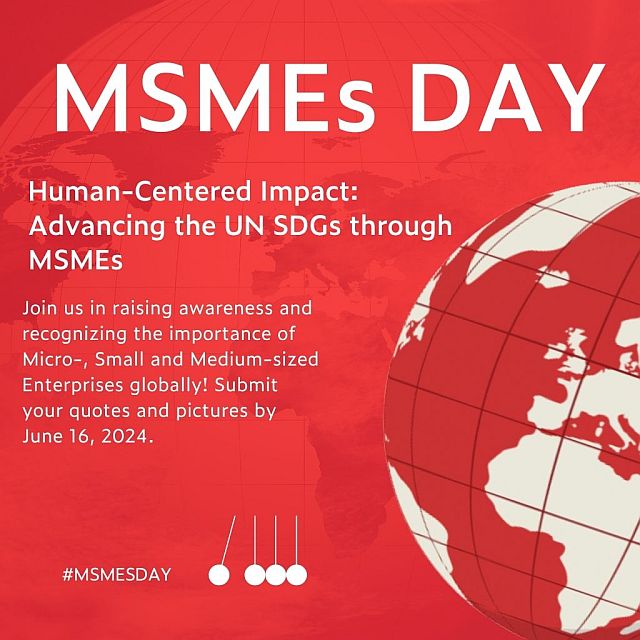Human-Centered Impact: Advancing the UN SDGs through MSMEs
As we steer our ship into a New Development Course in a Changing World, the importance of Micro, Small, and Medium Enterprises (MSMEs) and the circular economy is crystal clear. MSMEs, which account for 90% of businesses, more than 70% of employment, and 50% of GDP worldwide, remain the core of the economy for most societies.
The United Nations General Assembly designated June 27 as “Micro-, Small, and Medium-sized Enterprises Day” (A/RES/71/279) to raise awareness of the tremendous contributions of micro-, small and medium-sized enterprises (MSMEs) to the achievement of the United Nations Sustainable Development Goals (SDGs). Together with MSMEs and entrepreneurs, we can reach the SDGs.
The Circular Economy – A Paradigm Shift with a Human-Centered Approach and MSMEs’ Role
A human-centered approach is central to the evolving ‘circular economy,’ emphasizing the importance of individuals and communities in driving sustainable transformation. Considering people’s well-being and prioritizing inclusive participation ensures that new systems align and contextualize local culture and personal/institutional needs. The circular economy represents a transformative framework to eliminate waste while fostering continuous resource utilization and social and economic development.
Replacing the linear ‘take-make-waste’ model, the circular economy relies on a closed-loop principle that focuses on human-centered product design, durability, reusability, remanufacturing, and recycling. Micro, Small, and Medium Enterprises (MSMEs) are vital in this paradigm shift. It includes the green and blue economies, which are the base for sustainability and make for a more liveable planet.
As crucial drivers of local economies, they are uniquely positioned to incorporate circular practices into their operations. By leveraging their agility and local knowledge, MSMEs can adopt innovative business models prioritizing sustainability and profitability while enhancing productivity and responding to local communities’ needs. Their role in designing people-oriented products and services underscores the importance of resilient, sustainable enterprises that meet environmental goals and community needs.
The UN SDGs and Circular Economy
The Circular Economy concept intersects with multiple Sustainable Development Goals (SDGs), notably SDG 12 (Responsible Consumption and Production). It promotes sustainable practices by emphasizing efficient resource use, waste reduction, and recycling. SDG 9 (Industry, Innovation, and Infrastructure) is also relevant as the Circular Economy encourages innovation in production processes and technology to create more sustainable systems.
Moreover, SDG 13 (Climate Action) is addressed through the Circular Economy’s focus on mitigating climate change impacts by reducing resource extraction and disposal emissions. Furthermore, SDG 7 (Affordable and Clean Energy) is supported as circular practices optimize energy use and promote renewable energy sources. SDG 8 is about “decent work and economic growth” in which workers, in cooperation with employers, can jointly implement a Circular Economy model that drives growth and productivity.
In the SDG 11 (Sustainable Cities and Communities) context, the Circular Economy contributes to building more sustainable urban environments by minimizing environmental degradation and enhancing resource resilience. Lastly, the Circular Economy aids in achieving SDGs 14 and 15 (Life Below Water and Life on Land) by reducing pollution and waste generation, conserving ecosystems, and preserving biodiversity.
MSMEs Forward Together
The circular economy and MSMEs are inherently linked through a shared commitment to sustainability and growth. By adopting a human-centered approach within the circular economy framework, MSMEs can survive and thrive amid uncertainties by aligning their products and services with people’s needs and aspirations.
MSMEs can lead the charge toward a sustainable and prosperous future with the proper support from governments, international organizations, and consumers. Governments and development partners can create an environment that supports MSMEs in their efforts to invest, trade, and thrive in global markets and harness the related development benefits.
The journey is long and challenging, but unity, innovation, and resilience will help us reach our destination. As we celebrate Micro, Small, and Medium Enterprises Day, let’s reaffirm our commitment to supporting these agents of innovation, growth, and sustainability. Together, with a human-centered mindset, we can shape an economically prosperous and environmentally sustainable future.
“The future depends on what we do in the present.” – Mahatma Gandhi


